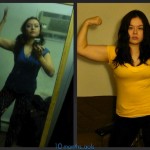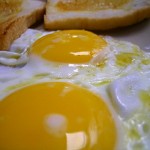We’ve all heard it before. Those words spread from generation to generation that keep us waking and scarfing food before rushing out the door.
Breakfast is the most important meal of the day.
Well I … I quit. I quit eating breakfast.
Why I Quit Eating Breakfast
It pains me to even try this since of the different types of foods, I love breakfast foods the best. So what would drive me to buck common health sayings and my favorites foods?

Striving for Lean Gains led me to quit eating breakfast.
It is true. My research led me to several different web sites, but there are four that kept coming back to the surface:
- Lean Gains – Martin Berkhan
- Eat Stop Eat – Brad Pilon
- Body Recomposition – Lyle Mc Donnald
- Alan Aragon
As I kept digging one thing resonated – rethink what I’ve been taught. Perhaps it is because I tend to be counter-cultural (or at least counter-mass-market) that I was fascinated by their research. Perhaps I just find truth compelling.
What I found is that again many of the things I’ve been told over and over are not backed by science. In fact many of the traditional guidelines about nutrition are disproven by science; yet they are still around.
Brad Pilon’s Eat Stop Eat
There’s a growing body of evidence and sentiment that promotes the use of intermittent fasting in conjunction with any exercise and fitness program you may have embarked upon. This is no accident. Fasting has long been shown to deliver benefits that can’t be achieved through other means, and it would be a mistake to discount it as a faddish or fringe method undeserving of your attention.
Checkout Eat Stop Eat for more information.
Top Ten Fasting Myths Debunked
Martin Berkhan spent considerable time researching and refuting the top ten fasting myths and I will just summarize his work here. I highly recommend taking time to head over to Lean Gains and read Martin’s Top Ten Fasting Myths Debunked article in its entirety.
Myth #1: Eat frequently to “stoke the metabolic fire”.
The evidence just doesn’t back the supposed benefits of eating more frequently.
Studies using whole-body calorimetry and doubly-labelled water to assess total 24 h energy expenditure find no difference between nibbling and gorging.
Myth #2: Eat smaller meals more often for hunger control.
Turns out that by eating smaller meals you might actually end up being more hungry. Eat and be satisfied.
There’s no doubt that meal frequency is highly individual. However, absolute statements claiming smaller meals are superior for hunger and appetite control are untrue and are based on studies using methods that greatly differed from real-world meal patterns. Current research with a normal meal pattern and protein intakes that are closer to what can be seen in a typical non-retarded diet, suggests superior appetite control when eating fewer and larger meals.
Myth #3: Eat small meals to keep blood sugar levels under control.
According to legions of diet and health “experts,” eating small meals every so often will help you avoid hunger pangs, provide you with stable energy throughout the day and keep you mentally sharp. Contrary to what many people seem to believe, blood sugar is extremely well-regulated and maintained within a tight range in healthy people. It does not swing wildly up and down like a chimpanzee on meth and it doesn’t plummet from going a few hours without food.
Myth #4: Fasting tricks the body into “starvation mode”.
Looking at the numerous studies I’ve read, the earliest evidence for lowered metabolic rate in response to fasting occurred after 60 hours (-8% in resting metabolic rate). Other studies show metabolic rate is not impacted until 72-96 hours have passed (George Cahill has contributed a lot on this topic).
Myth #5: Maintain a steady supply of amino acids by eating protein every 2-3 hours. The body can only absorb 30 grams of protein in one sitting.
The simple truth is that more protein just takes a longer time to digest and be utilized. For some concrete numbers, digestion of a standard meal is still incomplete after five hours. Amino acids are still being released into your bloodstream and absorbed into muscles. …
Think about this for a second. How long do you think a big steak, with double the protein intake of the above example, and a big pile of veggies would last you? More than 10 hours, that’s for sure.
Myth #6: Fasting causes muscle loss.
This myth hinges on people’s belief it’s important to have a steady stream of amino acids available to not lose muscle. As I explained earlier, protein is absorbed at a very slow rate. After a large high-protein meal, amino acids trickle into your blood stream for several hours.
Few studies has examined the effects of regular fasting on muscle retention and compared it to a control diet. None of them are relevant to how most people fast and some are marred by flaws in study design and methodology. Like this study which showed increased muscle gain and fat loss, with no weight training or change in calorie intake, just by changing meal frequency. While I would love to cite that study as proof for the benefits of intermittent fasting, body composition was measured by BIA, which is notoriously imprecise.
Myth #7: Skipping breakfast is bad and will make you fat.
[Remember I went on this quest to learn about lean gains, so this myth definitely caught my attention. Read closely.]
Breakfast skipping is associated with higher body weights in the population. The explanation is similar to that of lower meal frequencies and higher body weights. Breakfast skippers have dysregulated eating habits and show a higher disregard for health. People who skip breakfast are also more likely to be dieting, thus by default they are also likely to be heavier than non-dieters. Keep in mind that most people who resort to breakfast skipping are not the type that sit around and read about nutrition. They are like most people dieting in a haphazard manner. The type to go on a 800 calorie-crash diet and then rebound, gaining all the weight (and then some) back.
His position is that skipping breakfast isn’t the problem. Skipping breakfast is just a sign that often is associated with other eating problems.
Myth #8: Fasting increases cortisol.
Cortisol is a steroid hormone that maintains blood pressure, regulates the immune system and helps break down proteins, glucose and lipids.
Short-term fasting has no effect on average cortisol levels and this is an area that has been extensively studied in the context of Ramadan fasting. Cortisol typically follows a diurnal variation, which means that its levels peak in the morning at around 8 a.m. and decline in the evenings. What changes during Ramadan is simply the cortisol rhythm, average levels across 24 hours remain unchanged.
In one Ramadan study on rugby players, subjects lost fat and retained muscle very well. And they did despite training in a dehydrated state, without pre-workout or post-workout protein intake, and with a lower protein intake overall nonetheless. Quoting directly from the paper:
“Body mass decreased significantly and progressively over the 4-week period; fat was lost, but lean tissue was conserved…”
Myth #9: Fasted training sucks. You’ll lose muscle and have no strength.
[This one Martin gives a recommendation of consuming BCAA before, during, and after fasted workouts. My problem is attempting to do this on a non-profit-budget; means no BCAA for me. Not sure what to do here personally.]
In conclusion, training in the fasted state does not affect your performance during weight training, which is what most people reading this are interested in. However, training in a completely fasted state is still not something I recommend for optimal progress. Research is quite clear on the benefits of pre-workout and post-workout protein intake for maximizing protein synthesis. For this reason, I suggest supplementing with 10 g BCAA prior to fasted training.
Myth #10: “Eat breakfast like a king, lunch a queen, dinner like a pauper.”
The strongest argument against this are the numerous studies available on body composition and health after and during Ramadan fasting. This meal pattern of regular nightly feasts has a neutral or positive effect on body fat percentage and other health parameters. This is quite an extreme and telling example. People literally gorge on carbs and treats in the middle of the night to no ill effect. And yet, in the bizarre world of bodybuilding and fitness, people worry whether it’s OK to eat 50 grams of carbs in their last meal.
If the scientific data on Ramadan fasting aren’t enough, there are plenty of other studies showing no effect on weight loss or weight gain from eating later in the day.
In one study comparing two meal patterns, which involved one group eating more calories earlier in the day and one group eating most calories later in the day, more favorable results were found in the group eating large evening meals. While those who ate more in the AM lost more weight, the extra weight was in the form of muscle mass. The late evening eaters conserved muscle mass better, which resulted in a larger drop in body fat percentage.
Enter Intermittent Fasting
So I’m starting it out. I quit, I quit eating breakfast. I quit and am going to try a period of intermittent fasting. Join me on the adventure.






Want to discuss? Join the conversation CubeDwellerFitness's Facebook Page.